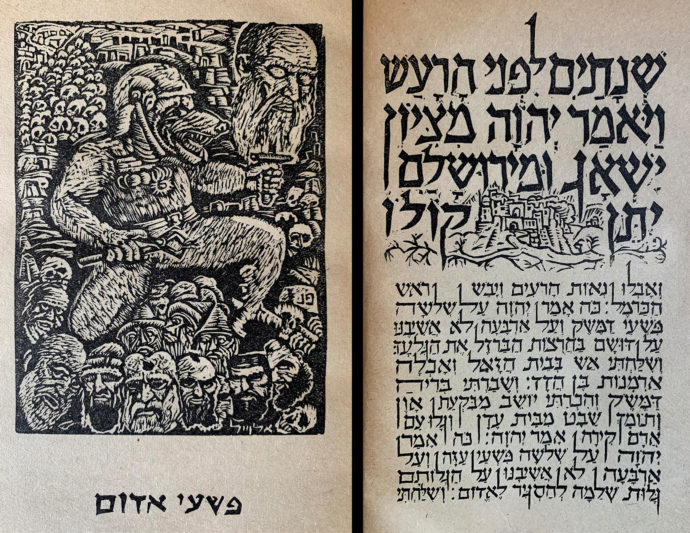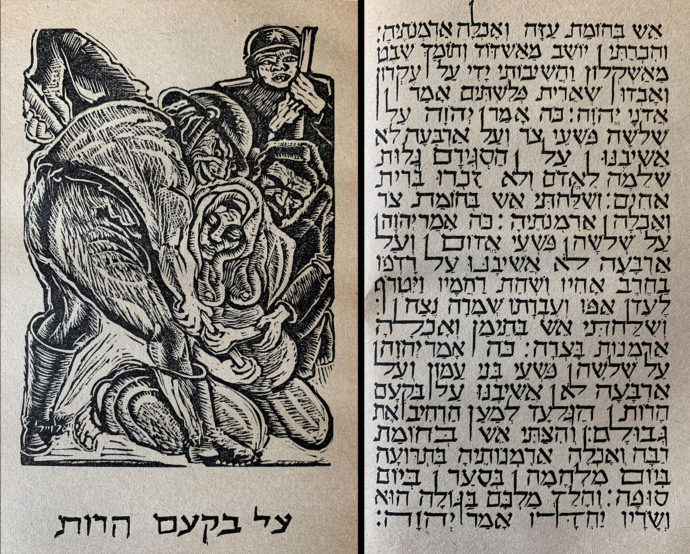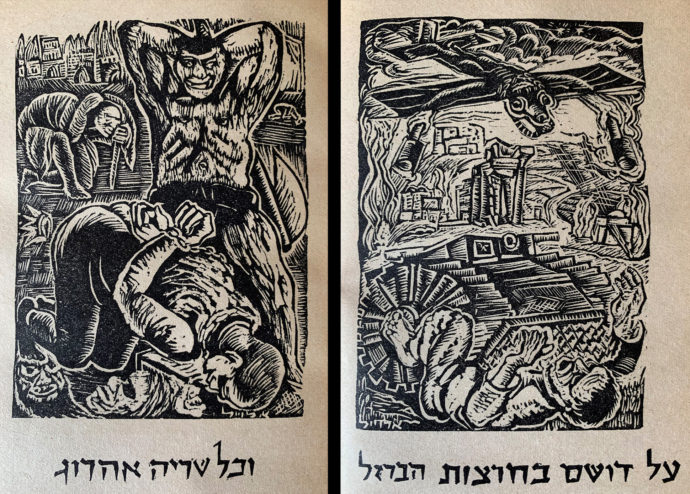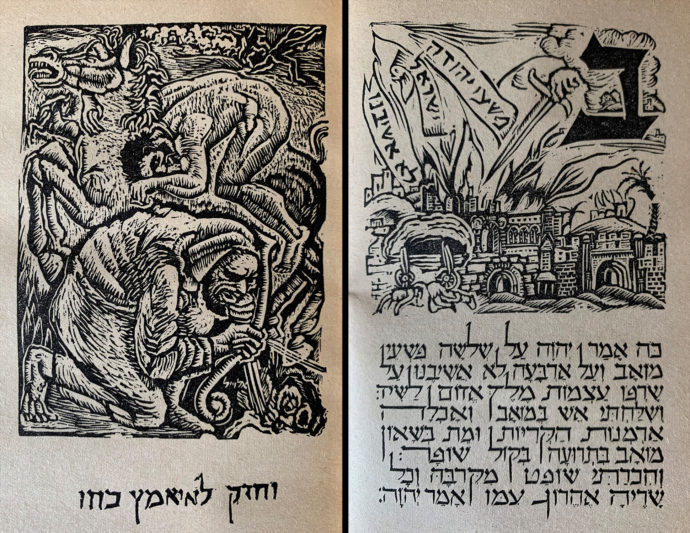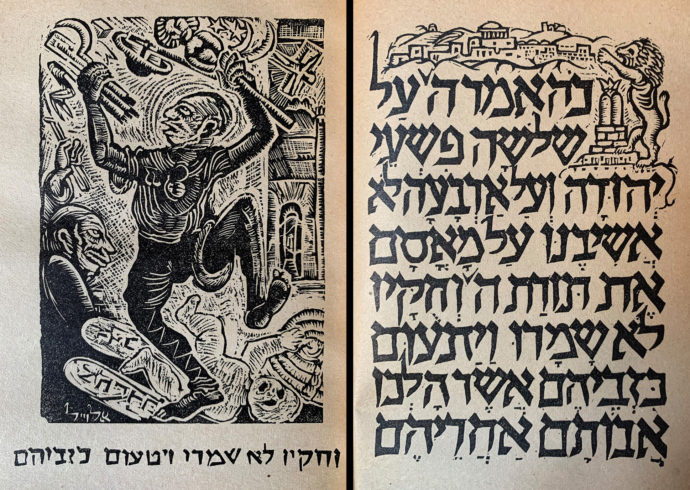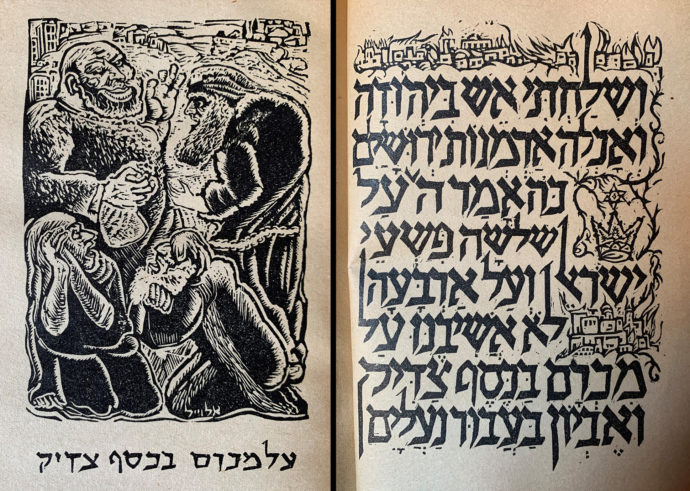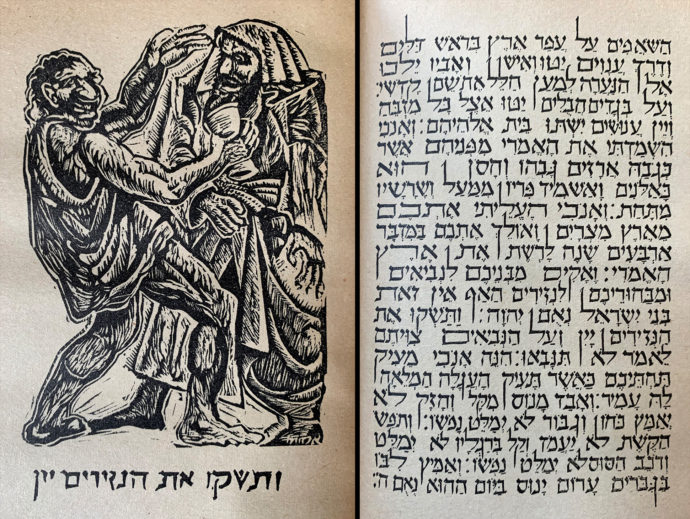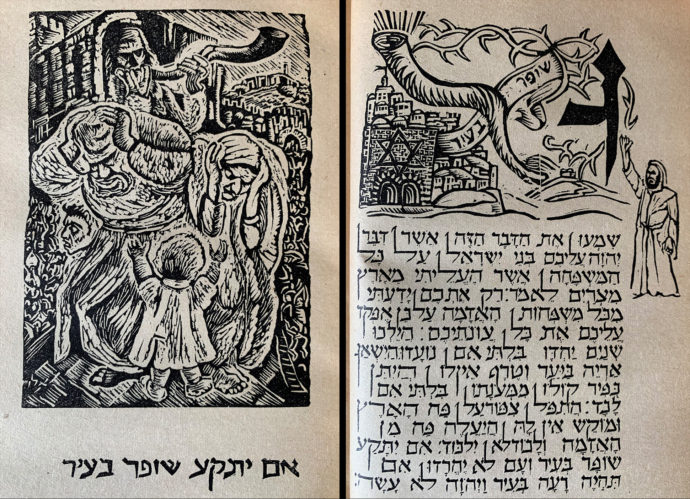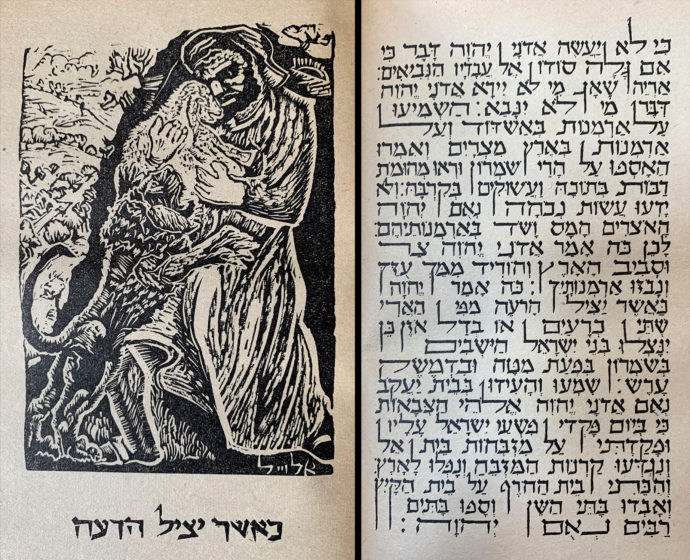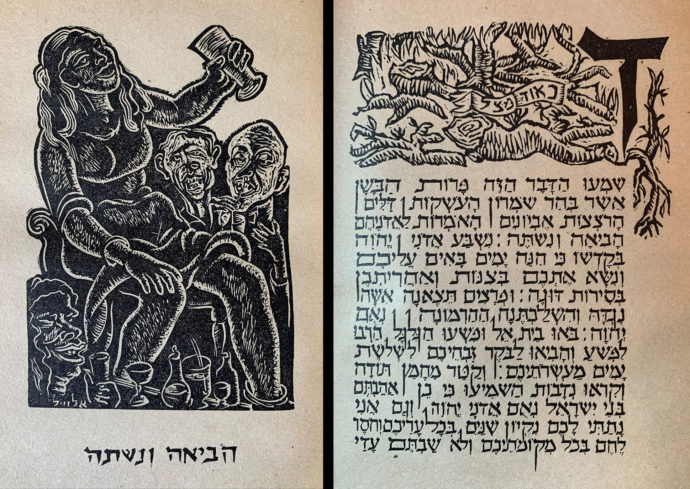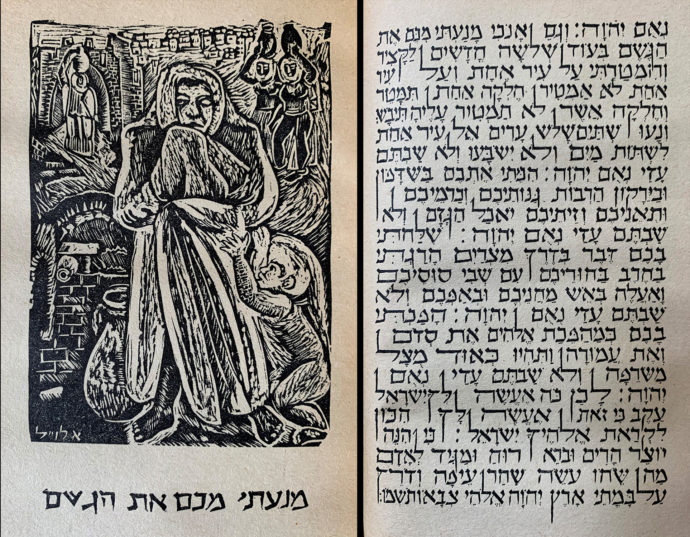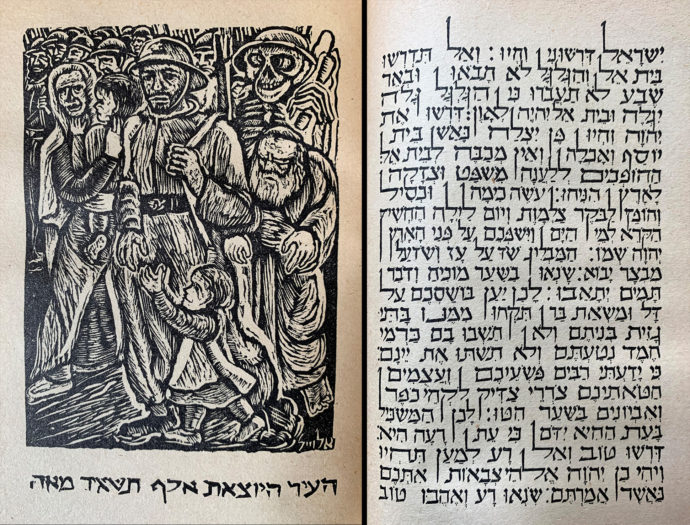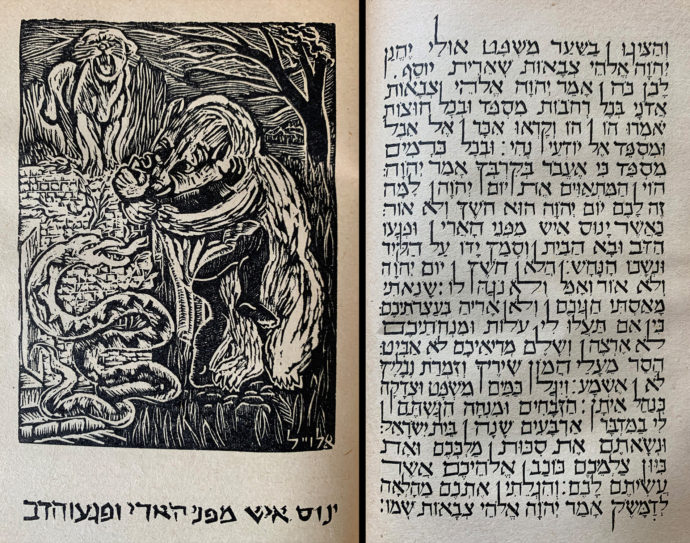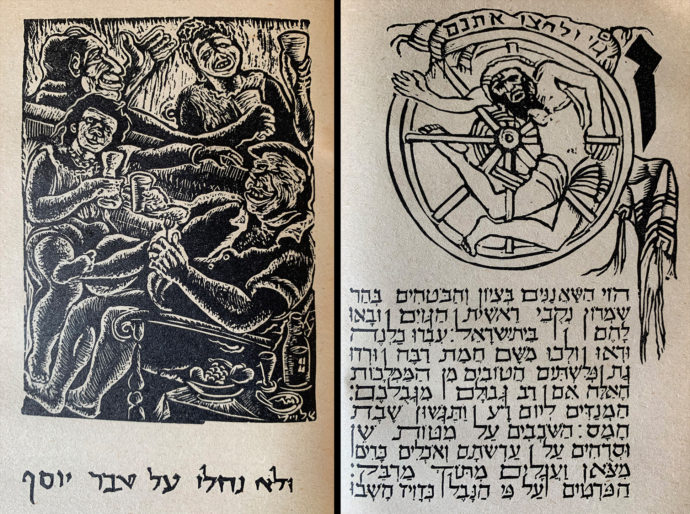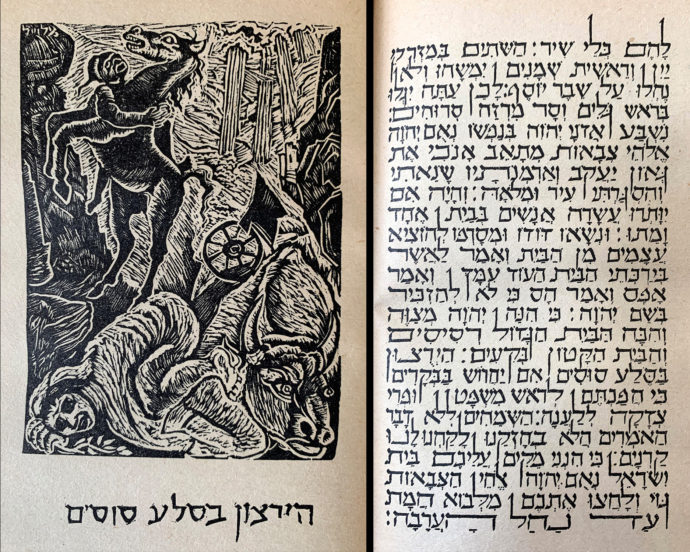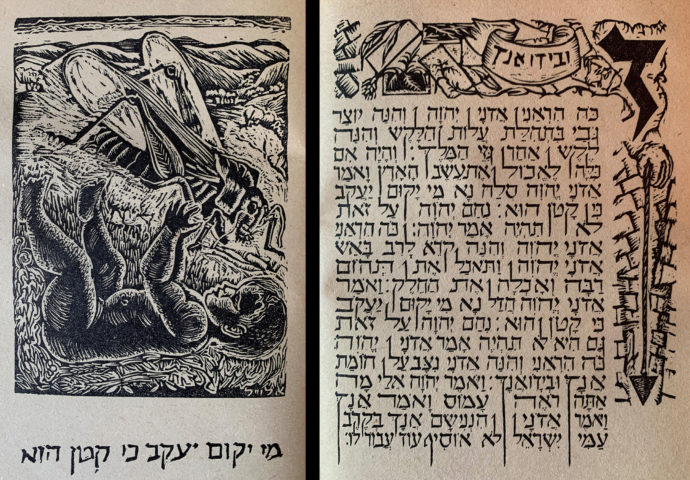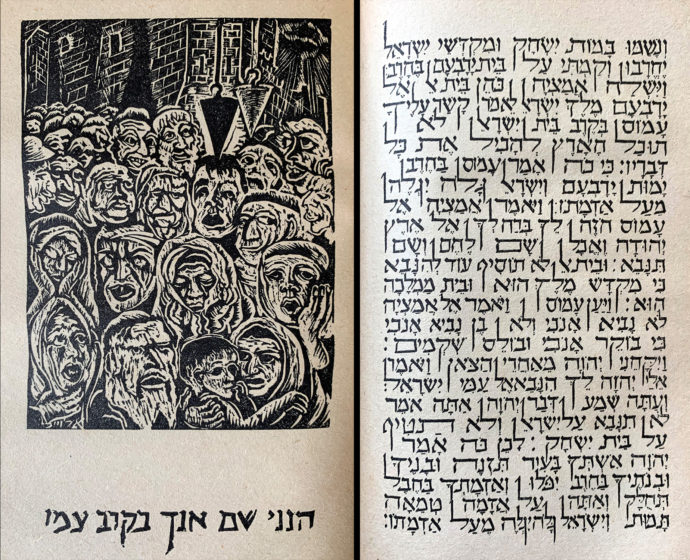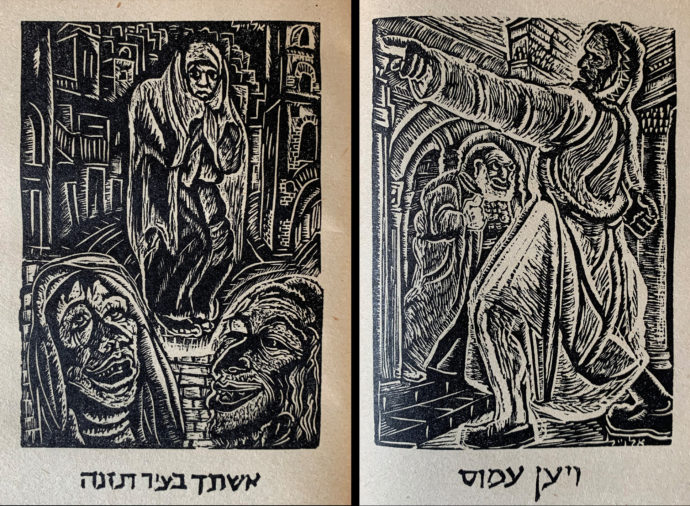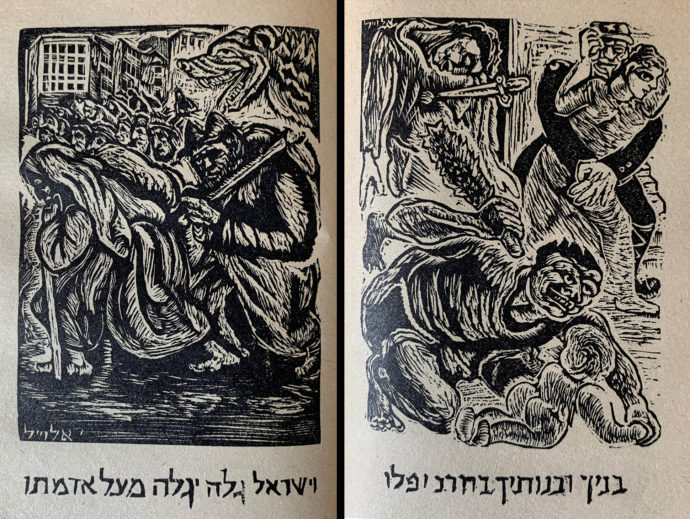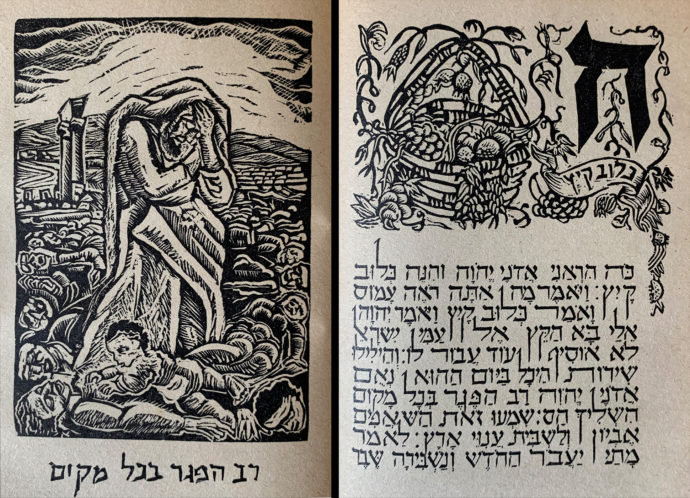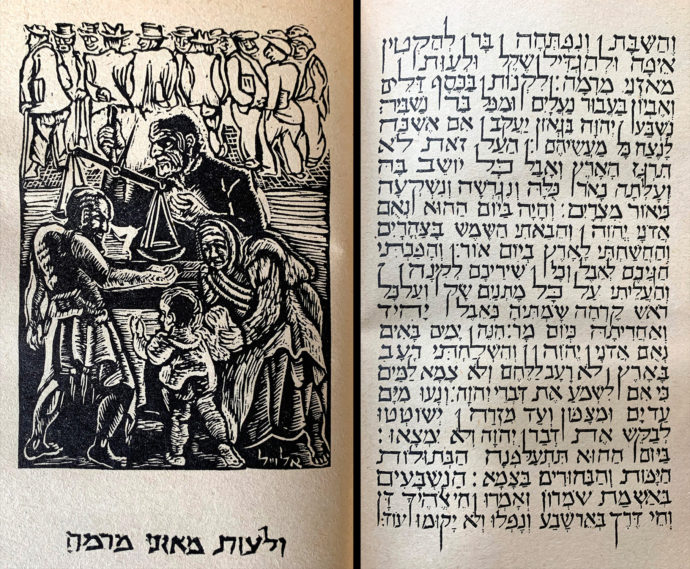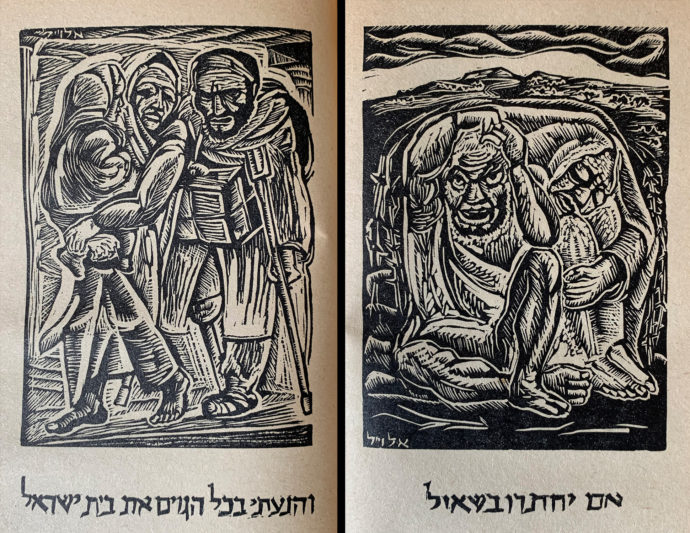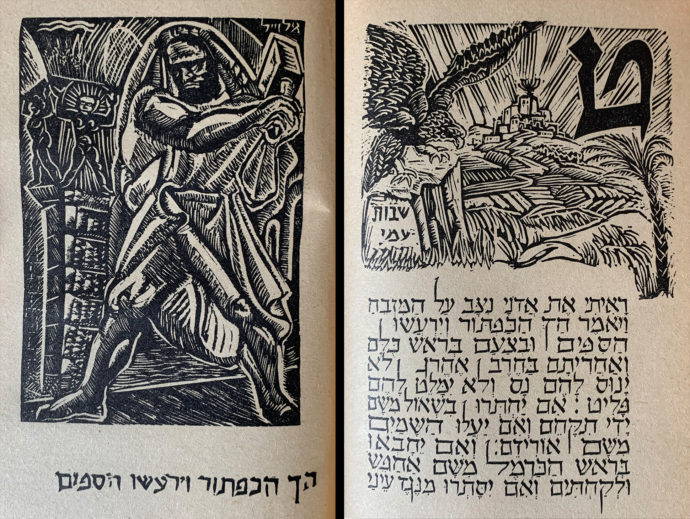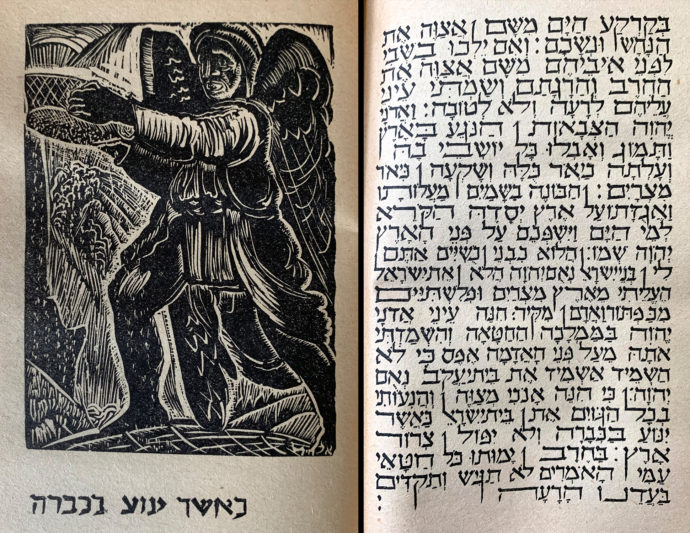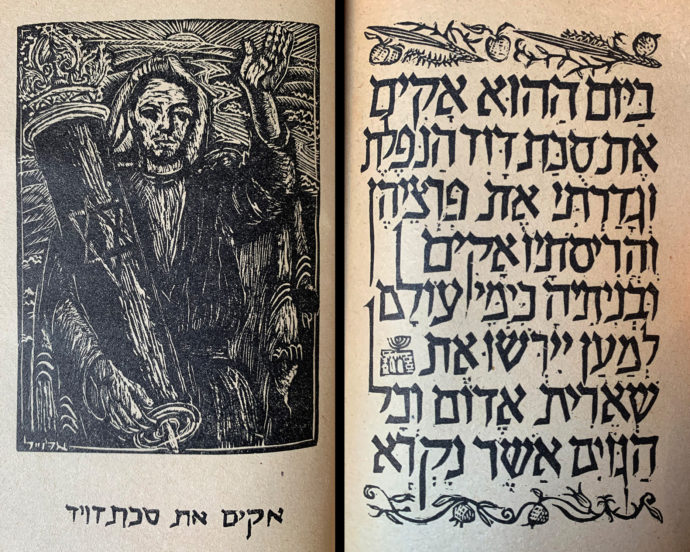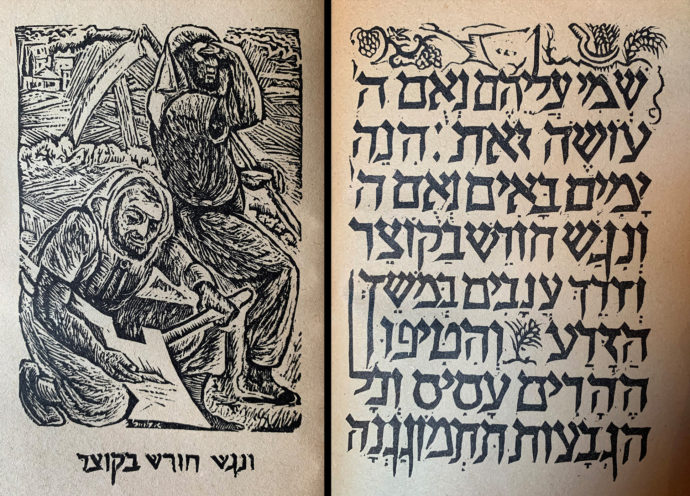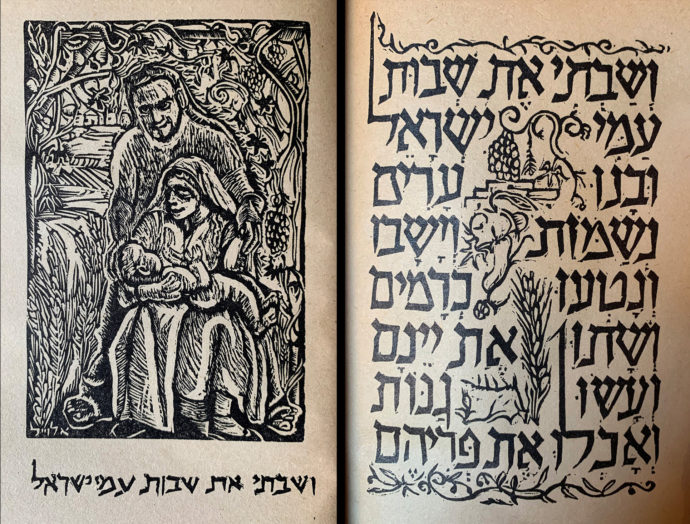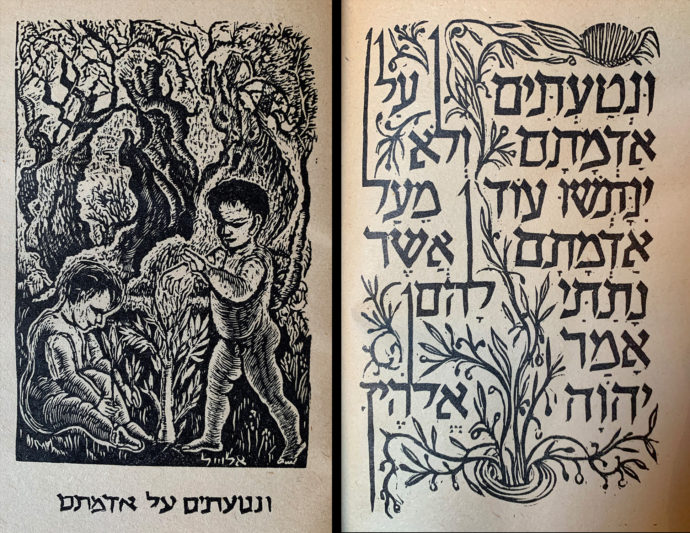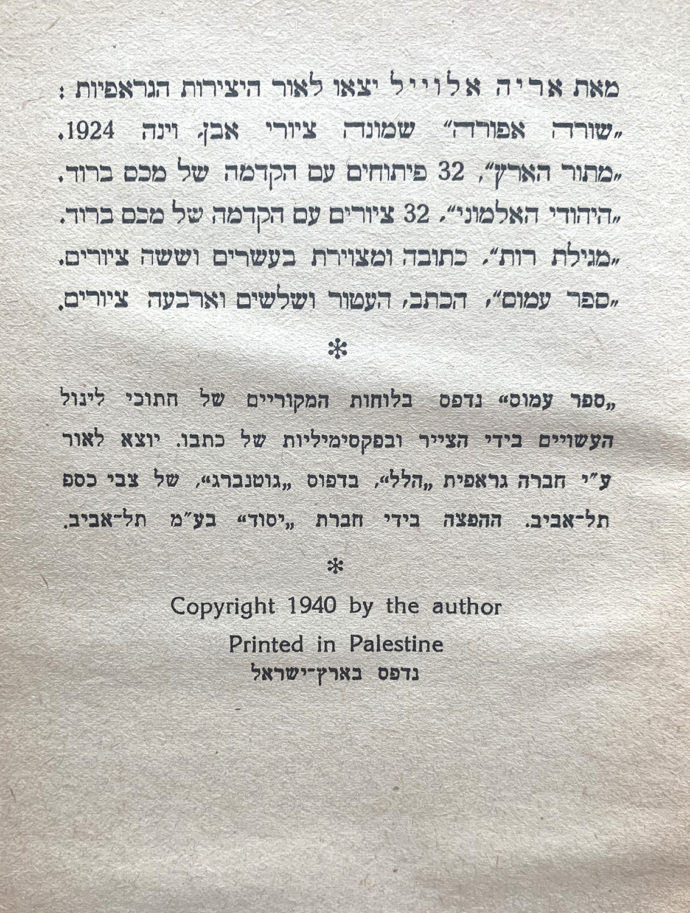Arieh Allweil: The Book of Amos: Part 2
Introduction
Welcome to the second part of my ART I SEE post on The Book of Amos (1940/41) by Jewish artist Arieh Allweil (1901-1967). Part 1 [LINK] provides a brief bio of the artist, discusses the issues behind translating the Hebrew text into English, and describes how the artist made the plates for his book. Preceding “The Book of Amos: Part 1” was my initial post on the artist: “Introducing Arieh Allweil” [LINK]. There I wrote how I was introduced to daughters of the artist and to two curators of his work, an in-depth biography of Allweil, and a listing of all of his significant illustrated books.
“The Book of Amos: Part 2” is devoted to presenting for the first time all of the pages of the 1941 edition. It differed from the 1940 edition in that two pages with red decoration that provide a dedication page and title page were added.
Over the next 12 months I hope to make similar presentations of Allweil’s other books, particularly those derived from Old Testament narratives: The Scroll of Ruth, The Scroll of Esther and The Scroll of Lamentations.
The images from The Book of Amos are presented courtesy of the Estate of Arieh Allweil.
The Prophet Amos
For the life of Prophet Amos, I first turned to Encyclopaedia Britannica website [LINK]:
“Amos, (flourished 8th century BC), the first Hebrew prophet to have a biblical book named for him. He accurately foretold the destruction of the northern [Jewish] kingdom of Israel (although he did not specify Assyria as the cause) and, as a prophet of doom, anticipated later Old Testament prophets.
“The little that is known about Amos’ life has been gleaned from his book, which was, in all likelihood, partly or wholly compiled by other hands. A native of Tekoa (now a ruin), 12 miles (19 km) south of Jerusalem, Amos flourished during the reigns of King Uzziah (c. 783–742 BC) of Judah (the southern [Jewish] kingdom) and King Jeroboam II (c. 786–746 BC) of Israel. By occupation, he was a herdsman; whether he was merely that or a man of some means is not certain. He actually preached for only a short time.
“Under the impact of powerful visions of divine destruction of the Hebrews in such natural disasters as a swarm of locusts and fire, Amos traveled from Judah to the neighbouring richer, more powerful kingdom of Israel, where he began to preach. The time is uncertain, but the Book of Amos puts the date as two years before an earthquake that may have occurred in 750 BC.”
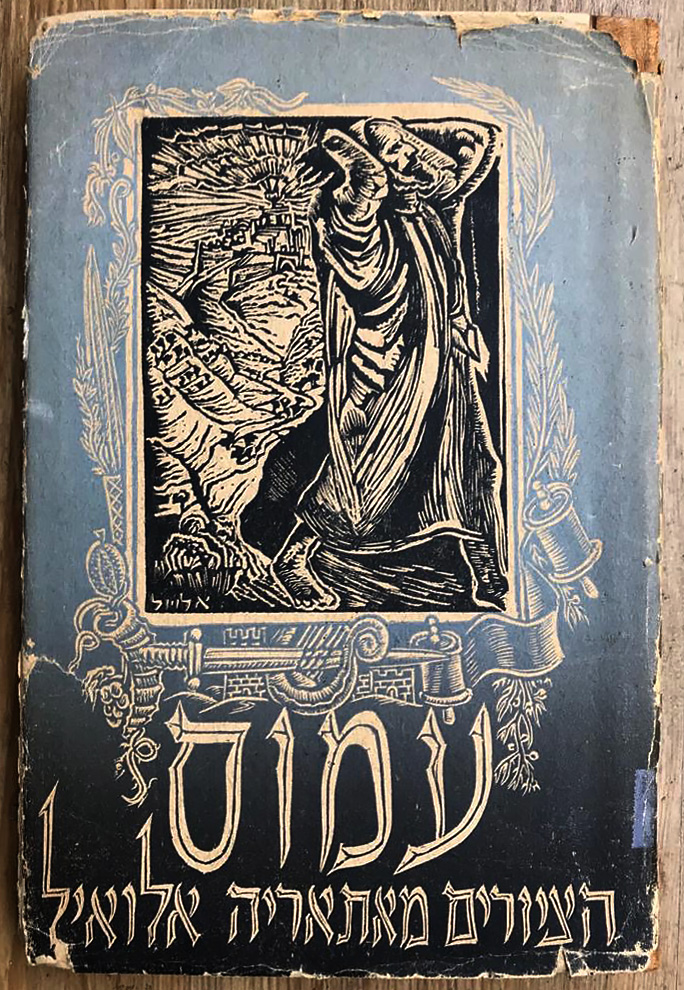
Allweil’s “The Book of Amos” with its paper cover. The book measures 23 cm x 15 cm (9 1/8″ x 5 7/8″) (Photo courtesy of Ruth Sperling and Nava Rosenfeld)
According to the Wikipedia listing [LINK] on Uzziah, 10th king of Judea, an earthquake caused the destruction of the Kingdom of Israel. “Geologists believe they have found evidence of this major earthquake in sites throughout Israel and Jordan” and placed its occurrence based on evidence at six archaeological sites “to the middle of the eighth century B.C., with dating errors of ~30 years…. The earthquake was at least magnitude 7.8, but likely was 8.2…”
“Amos fiercely castigated corruption and social injustice among Israel’s pagan neighbours, Israel itself, and Judah; he asserted God’s absolute sovereignty over man; and he predicted the imminent destruction of Israel and Judah. After preaching at Bethel, a famous shrine under the special protection of Jeroboam II, Amos was ordered to leave the country by Jeroboam’s priest Amaziah. Thereafter his fate is unknown.”
And for a more nuanced look at Amos, I turned to the Chabad website [LINK], which Professor Iddo Gal of the University of Haifa, Israel, used for his translations of Allweil’s The Book of Amos that appear here. In an email, he wrote: “The Chabad religious movement is a reputable and established Jewish organization.” Nissan Mindel wrote the Chabad essay on Amos (published and copyrighted by Kehot Publication Society).
In the section on “The Life and times of Amos,” Mindel described how King Jeroboam of Israel healed relations with the royal family of Judea and then stated:
“Together with the good political situation came economic prosperity. Many people in the Northern Kingdom became very wealthy, and began to lead a luxurious life…. Unfortunately, the unusual prosperity brought a collapse of moral standards. Ignored were the great ideals and commandments of the Torah to help the poor, and to practice justice and loving kindness. The rich oppressed the poor; might was right; it was an age of corruption.”
At the same time, Mindel wrote, idolatry increased. The Golden Calves, set up by King Jeraboam, “were worshipped more than before and the teachings of the Torah and the holy commandments were viewed with contempt.” The Lord in turn sent prophets, among them Amos, to warn against idolatry. “Yet the admonitions were, for the most part, unheeded.”
In the section on Amos’ prophesies, Mindel wrote:
“His fearless and outspoken words came thundering and stirred the people. Characteristic are his opening words: ‘G‑d will roar from Zion, and utter His voice from Jerusalem; and the habitations of the shepherds shall mourn, and the top of Carmel shall wither.’ By ‘the shepherds’ he must have meant the leaders of Israel, who failed their ‘flock;’ and ‘the top of Carmel’ were likewise those sitting at the top, who will be first to be stricken down.”
Mindel continued with Amos’ warning to Judea: “Thus with G‑d, ‘For three transgressions of Judah, and for four, I will not withhold My punishment: because they have despised the Torah of G‑d, and have not kept His commandments…’ ” And to the Kingdom of Israel, Amos warned: “Thus saith G‑d, ‘For three transgressions of Israel, and for four, I will not withhold My punishment: because they sold the righteous for silver, and the poor for a pair of sandals…’ “
Then in Mindel’s essay, Amos turned to Bashan: “Fearlessly, the prophet admonishes the ‘Kine (beasts) of Bashan, that are in the mountains of Samaria, who oppress the poor, who crush the needy.’ He warned the rich who had amassed their fortunes by cheating and robbery, that they would not enjoy their riches, but would lose everything when the land went down in doom.”
And in Bethel, according Mindel, “Amos was not afraid to appear in Bethel at the very time when crowds were gathered there to worship the Golden Calf which Jeroboam the First, had set up in a special temple. In the very midst of the celebration, Amos announced the terrible punishment that G‑d would bring upon the sinful people of Israel. The crowd became angry, and their leader, the false priest Amaziah, incited the people to do violence to Amos. However, King Jeroboam protected the prophet, and let no harm befall him.”
And the Chabad author wrote: “The prophet reminded the people of the many kindnesses which G‑d had shown them since the beginning of their history as a people. ‘You only, have I known of all the families of the earth; therefore I will visit upon you all your sins,’ the prophet said, telling them that because G‑d has chosen them as His people, He demands of them higher standards, and, like a loving father punishes his erring son just because he loves him, so G‑d would punish them for their sins.”
In the short section on “The Book of Amos,” Mindel wrote: “The Book of Amos consists of nine chapters, but despite his severe admonitions in most of the book, he finishes his prophecies on a happy note, of the wonderful things that will happen to the Jewish people on ‘That Day,’ on the day of the true Redemption: ‘In that day will I raise up the tabernacle of David that is fallen, and close up the breaches thereof; and I will raise up his ruins, and I will build it as in the days of old….’ “
I’ll conclude this section with two paragraphs of commentary from the Britannica listing:
“From his book, Amos emerges as a thoughtful, probably well-traveled man of fierce integrity, who possessed a poet’s gift for homely but forceful imagery and rhythmic language. So distinctive is his style of expression that in many instances the reader can distinguish those portions genuinely by Amos from parts probably invented by others, such as the concluding, optimistic section foretelling the restoration of the Davidic kingdom.
“As a theologian, Amos believed that God’s absolute sovereignty over man compelled social justice for all men, rich and poor alike. Not even God’s chosen people were exempt from this fiat, and even they had to pay the penalty for breaking it; hence, Amos also believed in a moral order transcending nationalistic interests.”
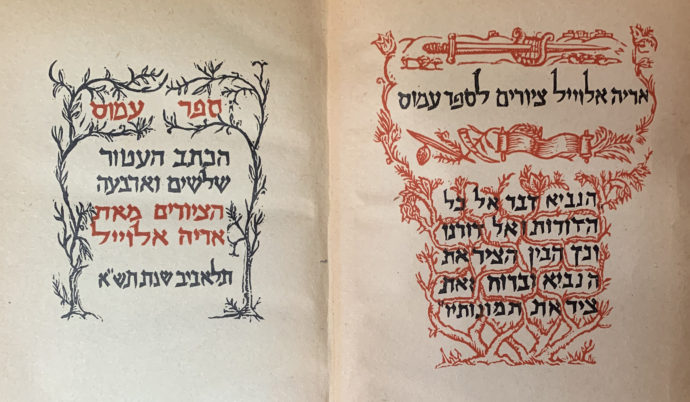
The dedication page (right) and title page (left) of Arieh Allweil’s 1941 “The Book of Amos.” He made both the pictorial elements and the Hebrew letters as linocuts. These pages were added to “Amos” that was first published in 1940.
THE BOOK Of Amos
Iddo Gal translated the opening pages of Arieh Allweil’s 1941 revised The Book of Amos thusly:
RIGHT: (top line) Arieh Allweil paintings for Book of Amos (next five lines) The prophet spoke to all generations and to our generation and so the painter understood the prophet and in that spirit the painter painted his paintings
LEFT: Book of Amos The decorated script with thirty four paintings by Arieh Allweil Tel Aviv year 1941
COMMENTARY: Note that Hebrew is written from right to left; therefore, the book is read from right-hand page to left-hand page. For the word “painting” read “artwork,” specifically linocuts as Allweil indicated in the last-page colophon. Ruth Sperling’s daughter, Galia Sasson, suggested that instead of “the decorated script” the Hebrew words “הכתב העטור” be translated “the illuminated manuscript.” She also suggested that the Hebrew “״ציורים for “paintings” be less literally translated as “linocut/lino engravings.” But as you will see in the colophon (the last page in this blog post), Allweil used the Hebrew word for paintings to describe his illustrated books in general (the top section of the colophon), but then shifted to the word for linocuts (in the lower section of the colophon) to describe The Book of Amos in particular.
In his autobiographical essay in the book Allweil (Arieh Allweil, Max Brod and I.M. Lask, Sinai Publishing, Tel Aviv, Israel, 1955), Allweil again used the quote “The prophet spoke to all generations…” that served as his motto. He then said: “One of the writers advised me to quote these words as a motto in my illustrations to the book of Amos. This text I wrote with my personal lettering [i.e. his own Hebrew font], and opposite every written page I printed a Lino-cut. I similarly made three megillahs [scrolls, or more loosely translated, narratives]: Ruth, Esther and Lamentations. I put figures into our home, the people are our brothers, our parents and our children.”
I believe that what Allweil meant by the last sentence (“I put figures into our home,…) is that his linocuts would reflect not only the Old Testament days of the Prophet Amos but the agonies of the Holocaust that began in the 1930s. In his essay, he then quoted from the biblical text of Amos and then indicated how he used contemporary events to illustrate that text:
” ‘Shall a trumpet be blown in the city.‘ This is a siren for an air-raid. On the day when I finished the book Amos, the first Italian bombs fell; they fell on our house, and we were saved. ‘Though they climb up to heaven, thence will I bring them down.’ This mean aeroplanes. ‘With threshing instruments of iron.’ I know what this means–tanks.”
Look for such visual anachronisms throughout the images in Allweil’s Amos.
Chapter 1 (Aleph)
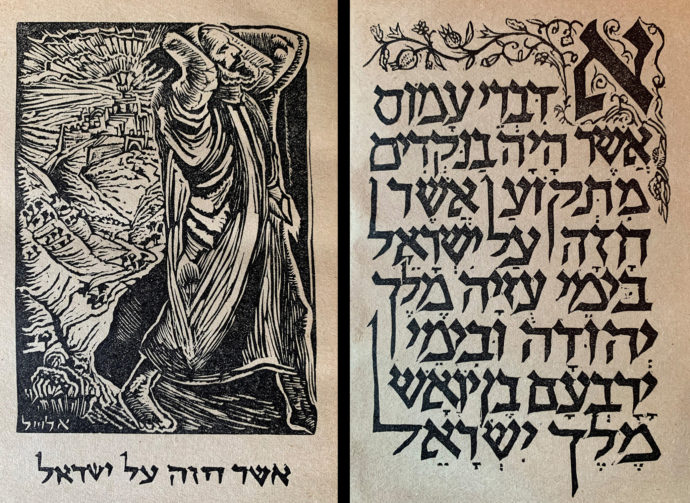
RIGHT: The words of Amos, who was among the herdsmen from Tekoa, who prophesied [foresaw] concerning Israel in the days of Uzziah, king of Judah, and in the days of Jeroboam, son of Joash, king of Israel.
LEFT: Who prophesied (saw) concerning Israel
RIGHT: Two years before the earthquake. And he said: The Lord shall roar from Zion, and from Jerusalem He shall give forth His voice. And the shepherds’ dwellings shall be cut off, and the Carmel fruitful land shall wither; So said the Lord: For three transgressions of Damascus, yea for four, I will not return them; Because they threshed the Gileadites with sledges of iron. And I will send fire into Hazael’s house, and it shall consume the palaces of Ben-Hadad; And I will break the bolt of Damascus, and cut off inhabitants from Bikath-Aven, and one who holds the scepter from Beth-eden, and the people of Aram exiled to Kir; So said the Lord: For three transgressions of Gaza, yea for four, I will not return them; Because they carried away a whole captivity, to deliver to Edom.
LEFT: Crimes (transgressions) of Edom
RIGHT: And I will send fire into the wall of Gaza, and it shall consume its palaces. And I will cut off an inhabitant from Ashdod and one who holds the scepter from Ashkelon, and I will return My hand upon Ekron, and the remnant of the Philistines shall be lost, says the Lord God. So said the Lord: For three sins of Tyre, yea for four, I will not return them; Because they delivered a whole captivity to Edom and did not remember the brotherly covenant. And I will send fire into the wall of Tyre, and it shall consume its palaces. So said the Lord: For three sins of Edom, yea for four, I will not return them: For pursuing their brother with a sword, and they destroyed their mercy and grasped forever their anger and kept their fury forever. And I will send fire into Teman, and it shall consume the palaces of Bozrah. So said the Lord: For three transgressions of the children of Ammon, yea for four, I will not return them: Because they ripped up the pregnant women of Gilead, in order to enlarge their border. So said the Lord: For three transgressions of the children of Ammon, yea for four, I will not return them: Because they ripped up the pregnant women of Gilead, in order to enlarge their border. And their king shall go into exile, he and his princes together, said the Lord.
LEFT: Because they ripped up the pregnant women of Gilead
RIGHT: Because they threshed the Gileadites with sledges of iron
LEFT: And all its princes I will slay
CHAPTER 2 (Beit)
RIGHT: So said the Lord: For three transgressions of Moab, yea for four, I will not return them; for he burnt the bones of the king of Edom to lime; And I will send fire into Moab, and it shall consume the palaces of Kerioth, and Moab shall die amidst the tumult, with shouting, with the sound of the shofar; And I will cut off a judge from within it, and all its princes I will slay with him, says the Lord.
LEFT: And the strong shall not gain strength
RIGHT: So said the Lord: For three transgressions of Judah, yea for four, I will not return them; for they rejected the Law of the Lord, and they did not keep His statutes, and their lies mislead them, which their forefathers followed.
LEFT: And they did not keep His statutes, and their lies mislead them
RIGHT: And I will send a fire into Judah, and it shall consume the palaces of Jerusalem. So said the Lord: For three transgressions of Israel, yea for four, I will not return them; For selling an innocent man for money, and a poor man for his shoes [Rashi: fields].
LEFT: For selling an innocent man for money
RIGHT: Who aspire on the dust of the earth concerning the head of the poor, and they pervert the way of the humble, and a man and his father go to the maid, in order to profane My Holy Name. And they recline on pledged garments beside every altar, and the wine of the fined ones they drink in the house of their gods. And I destroyed the Amorites from before them, whose height is as the height of the cedar trees, and they are as strong as oaks, and I destroyed his fruit from above and his roots from below. And I brought you up from the land of Egypt, and I led you in the desert for forty years, to inherit the land of the Amorites. And I raised up some of your sons as prophets and some of your young men as Nazirites; is this not so, O children of Israel? says the Lord. And you gave the Nazirites to drink wine, and you commanded the prophets saying, “Do not prophesy.” Behold, I will oppress your dwelling place, as a wagon full of sheaves is oppressed. And escape shall be lost to the swift, and the strong shall not gain strength, nor shall the mighty man deliver himself. And he who holds the bow shall not stand, and the fleetfooted shall not deliver, and the rider of the horse shall not deliver himself. And the stout-hearted among the mighty shall flee naked on that day, says the Lord.
LEFT: And you gave the Nazirites to drink wine
Chapter 3 (Gimel)
RIGHT: Hearken to this word which the Lord spoke about you, O children of Israel, about the entire family which I brought up from the land of Egypt, saying: Only you did I love above all the families of the earth; therefore, I will visit upon you all your iniquities. Will two walk together unless they agreed? Will a lion roar in the forest if he has no prey? Will a young lion let out a cry from his den unless he has taken something? Will a bird fall on a net upon the ground unless it has a snare? Will a net ascend from the ground and have taken nothing? Will a shofar be sounded in the city and the people not quake? Will there be evil in the city if the Lord has not done it?
LEFT: Will a shofar [ram’s horn] be sounded in the city?
RIGHT: For the Lord God does nothing unless He has revealed His secret to His servants, the prophets. A lion has roared; who will not fear? The Lord God has spoken; who will not prophesy? Announce in the palaces in Ashdod and in the palaces in the land of Egypt, and say; Gather upon the mountains of Samaria and see great confusions within it and people being oppressed in its midst. And they did not know to do right, says the Lord, who store up violence and plunder in their palaces. Therefore, so said the Lord God: An adversary, even round about the land! And he will bring down from you your strength, and your palaces will be spoiled. So said the Lord: As the shepherd saves from the lion’s mouth two legs or the cartilage of an ear, so will the children of Israel dwelling in Samaria be saved in the corner of a bed or in the corner of a couch. Hearken and warn the house of Jacob, says the Lord God, the God of the Hosts. For on the day I visit the transgressions of Israel upon them, I will visit upon the altars of Bethel, and the horns of the altar shall be cut off and shall fall to the earth. And I will smite the winter house with the summer house, and the ivory houses shall be lost, and great houses shall end, says the Lord.
LEFT: As the shepherd saves (the lamb from the lion’s mouth)
Chapter 4 (Dalet)
RIGHT: Hearken to this word, O cows of Bashan which are on Mount Samaria, who oppress the poor, who crush the needy, who say to their lords, “Bring that we may drink.” The Lord God has sworn by His holy [abode] that, behold, days are coming upon you, and you shall be borne on shields, and your posterity in fishing boats. And [through the] breaches they shall emerge, each woman straight before her, and you shall cast off the haughtiness, says the Lord. Come to Bethel and rebel, to Gilgal and multiply rebellion, and bring your sacrifices in the morning…And offer up an offering of leaven, and proclaim and publish the freewill offerings, for so you love, O children of Israel, says the Lord God. And also I have given you cleanness of teeth in all your cities, and lack of bread in all your places, but you have not returned to Me, says the Lord.
LEFT: Bring that we may drink
RIGHT: And I also withheld the rain from you when there were yet three months before the harvest, and I will cause to rain on one city, and on one city I will not cause to rain; one field shall receive rain, and the field upon which no rain shall fall, shall wither. And two or three cities wandered into one city to drink water, but they shall not be sated, but you have not returned to Me, says the Lord. I smote you with blast and with yellowing; the increase of your gardens and your vineyards and your fig trees and your olive trees the shearing locust has devoured, but you have not returned to Me, says the Lord. I sent a pestilence upon you after the manner of Egypt; I slew your young men with the sword, with the captivity of your horses, and I caused the stench of your camps to rise, and in your nostrils, but you have not returned to Me, says the Lord. I have overthrown some of you like God’s overthrow of Sodom and Gemorrah, and you were like a brand plucked from burning, but you have not returned to Me, says the Lord. Therefore, so will I do to you, O Israel; because I will do this to you, prepare yourself to meet your God, O Israel. For behold, He forms mountains and creates the wind, and declares to man what his speech is; He makes dawn into darkness, and treads on the high places of the earth; the Lord God of Hosts is His Name.
LEFT: I also withheld the rain from you
Chapter 5 (Hei)
RIGHT: Hearken to this word which I take up for a lamentation over you, O house of Israel. The virgin of Israel has fallen and shall not continue to rise; she is spread out on her soil, there is none to raise her up. For so said the Lord God: The city that gives forth a thousand shall remain with a hundred, and the one that gives forth a hundred shall remain with ten, of the house of Israel. For so said the Lord to the house of Israel; Seek Me and live.
LEFT: She is forsaken (abandoned) upon her land
RIGHT: But seek not Bethel, neither come to Gilgal, nor pass Beersheba, for Gilgal shall be exiled, and Bethel shall become nought. Seek the Lord and live, lest He break out like fire in the house of Joseph, and it consume with none to quench it for Bethel. Those who turn justice to wormwood, and who leave righteousness on the ground. He Who made the Pleiades and Orion and turns darkness into morning, and day He darkens as night; He Who calls the water of the sea and pours it out on the face of the earth, the Lord is His Name. Who strengthens the robbed upon the strong, and the robbed shall come upon a fortress. They hated him who reproves them in the gate, and they despise him who speaks uprightly. Therefore, because you have trodden on poor, and the burden of grain you take from him, houses of hewn stone you have built but you shall not dwell therein, precious vineyards you have planted, but you shall not drink their wine. For I know that your transgressions are many, and your sins are mighty; you who oppress the just, taking ransom, and turning aside the needy in the gate. Therefore, the prudent at that time shall keep silent, for it is a time of evil. Seek good and not evil in order that you live, and so the Lord God of Hosts shall be with you, as you said. Hate evil and love good, and establish justice in the gate; perhaps the Lord God of Hosts will be gracious to the remnant of Joseph.
LEFT: The city that gives forth a thousand shall remain with a hundred
RIGHT: Therefore, so said the Lord God of Hosts, the Lord: In all the city squares lamentation, and in all streets they shall say, “Alas! Alas!” and they shall meet the plowman with mourning and lamentation with those who know to wail. And in all vineyards [there shall be] lamentation, for I will pass in your midst, said the Lord. Woe to those who desire the day of the Lord. Why would you have the day of the Lord? It is darkness, and not light. As if a man flees from the lion and the bear meets him, and he comes to the house and leans his hand on the wall, and a serpent bites him. Is not the day of the Lord darkness and not light, even very dark, with no brightness in it. I hate, I reject your festivals, and I will not smell [the sacrifices of] your assemblies. For if you offer up to Me burnt- offerings and your meal-offerings, I will not accept [them], and the peace offerings of your fattened cattle I will not regard. Take away from Me the din of your songs, and the music of your lutes I will not hear. And justice shall be revealed like water, and righteousness like a mighty stream. Did you offer Me sacrifices and meal-offerings in the desert forty years, O house of Israel? And you shall carry Siccuth your king and Chiun your images, Kochav your god, which you have made for yourselves. And I will exile you beyond Damascus, said He Whose Name is the Lord God of Hosts.
LEFT: As if a man did flee from the lion and a bear met [hurt] him
Chapter 6 (Vav)
RIGHT: Woe to those who are at ease in Zion and who are secure in the mountain of Samaria, those called the first of the nations, and the house of Israel has come to them. Proceed to Calneh and see, and go from there to the great Hamath, and go down to Gath of the Philistines-are they better than these kingdoms, or is their border greater than your border? You, who bring yourselves closer to the day of evil, and you bring near the dwelling amidst violence. Those who lie on couches of ivory and stretch out on their beds, and eat lambs of the flock and calves out of the stall. Who sing according to the tone of the lute. They thought that their musical instruments were like [those of] David.
LEFT: And they feel no pain concerning the destruction of Joseph
RIGHT: Who drink from basins of wine, and with the first oils they anoint themselves, and they feel no pain concerning the destruction of Joseph. Therefore, now they shall go into exile at the head of the exiles, and the banquet of the haughty shall pass away. The Lord God swore by Himself. The Lord God of Hosts says; I abhor the pride of Jacob, and I hate his palaces, and I will deliver the city and the fullness thereof. And it shall be, if ten men are left in one house, they shall die. And his kinsman and the one who saved him from burning shall carry him to take out bones from the house, and he shall say to [the one] who is in the end of the house, “Are there any more with you?” and he shall say, “There is none.” And he shall say, “Take them out.” [This is] for not mentioning the Name of the Lord. For behold, the Lord commands, and he shall smite the great house into splinters, and the small house into chips. Will horses run on the rock, or will one plow with cattle, for you have perverted justice to hemlock and the fruit of righteousness to wormwood? Those who rejoice over a thing of nought, who say, “With our strength we have taken horns for ourselves.” For, behold I will raise up against you a nation, O house of Israel, says the Lord God of Hosts, and they shall oppress you from the approach to Hamath until the brook of the Arabah.
LEFT: Will horses run on the rock
Chapter 7 (Zain)
RIGHT: Thus the Lord God showed me, and behold He was forming locusts at the beginning of the shooting up of the latter growth, and behold the latter growth after the king’s mowings. And it came to pass, when it finished eating the grass of the earth, that I said, “O Lord God! Forgive now! Who shall arise [with] Jacob, for he is small?” The Lord relented … It shall not come about, said the Lord. Thus the Lord God showed me, and behold the Lord God calls to contend by fire, and it consumed the great deep. Thus …the Lord was standing on a wall made by a plumbline, with a plumbline in His hand.
LEFT: How shall Jacob stand, for he is small?
RIGHT: And the Lord said to me; What do you see, Amos? And I said, “A plumbline.” And the Lord said: Behold I place a plumbline in the midst of My people Israel; I will no longer pardon them. And the high places of Isaac shall become desolate, and the sanctuaries of Israel shall be ruined, and I will rise upon the house of Jeroboam with the sword. And Amaziah the priest of Bethel sent to Jeroboam king of Israel, saying, “Amos has conspired against you in the midst of the house of Israel. The land will be unable to endure all his words. For so said Amos; Jeroboam shall die by the sword, and Israel shall be exiled off its land.” And Amaziah said to Amos, “Seer, go, run away to the land of Judah and eat bread there; and prophesy there. But do not continue to prophesy in Bethel for it is the sanctuary of a king and the capital of the kingdom. And Amos replied and said to Amaziah, “I am neither a prophet nor the son of a prophet, but I am a cattle herder and an inspector of sycamores. And the Lord took me from following the flock, and He said to me; Go, prophesy to My people Israel. And now, hearken to the word of the Lord. You say, “Do not prophesy concerning Israel and do not prophesy concerning the house of Isaac.” Therefore, so said the Lord: Your wife shall play the harlot in the city, and your sons and daughters shall fall by the sword, and your land shall be divided by lot, and you shall die on unclean soil, and Israel shall be exiled from its land.
LEFT: Behold I place a plumbline in the midst of My people Israel
RIGHT: Then answered Amos
LEFT: Thy wife shall be a harlot in the city
RIGHT: Your sons and daughters shall fall by the sword
LEFT: And Israel shall be exiled from its land
Chapter 8 (Heit)
RIGHT: Thus the Lord God showed me, and behold a basket of summer fruits [overripe, spoiled]. And He said: What do you see, Amos? And I said, “A basket of summer fruits.” And the Lord said to me: The end has come to My people Israel. I will no longer pardon them. And the songs of the temple shall be wailings in that day, says the Lord God: corpses shall increase; in every place silence shall be cast. “Hearken to this, you who swallow up the needy, and to cut off [destroy] the poor of the land.” Saying: “When will the new moon be gone, that we may sell grain, (to make the ephah smaller and to make the shekel larger, and to pervert deceitful scales)?
LEFT: The corpses shall be many, in every place (silence shall be cast)
RIGHT: To purchase the poor with money, and the needy in order to inherit them, and the refuse of the grain we will sell.” The Lord swore by the pride of Jacob: I will never forget any of their deeds. Shall the land not quake for this, and shall all its inhabitants [not] be destroyed? Yea, it shall rise up wholly like the rain cloud, and it shall cast up and sink like the river of Egypt. And it shall come to pass on that day, says the Lord God, that I will cause the sun to set at midday, and I will darken the land on a sunny day. And I will turn your festivals into mourning, and all your songs into lamentation, and I bring up sackcloth on all loins, and baldness on every head, and I will make it like the mourning for an only son, and its end is like a bitter day. Behold, days are coming, says the Lord God, and I will send famine into the land, not a famine for bread nor a thirst for water, but to hear the word of the Lord. And they shall wander from sea to sea and from the north to the east; they shall run to and fro to seek the word of the Lord, but they shall not find it. On that day, the beautiful virgins and the young men shall faint of thirst. Those who swear by the sin of Samaria, and say, “As your god lives, O Dan,” and “As the road to Beersheba exists,” shall fall and no longer rise.
LEFT: And falsifying the balances (scales) by deceit
RIGHT: If they dig down into the underworld [graves]
LEFT: And I will scatter the house of Israel among all the nations
Chapter 9 (Tet)
RIGHT: I saw the Lord standing beside the altar, and He said: Smite the lintel [strike the beams], and the [side] posts shall quake, and break to pieces those who are at the head of all of them, and their remnant I will slay by the sword; no one of them shall flee, and no one of them shall escape. If they dig down into the underworld [graves], from there My hand shall take them, and if they ascend to the heavens, from there I will bring them down. And if they hide at the peak of Carmel, from there I will search [them out] and I will take them, and if they hide from My eyes (in the land of the sea, from there I will command the serpent, and it shall bite them).
LEFT: Smite the lintel [strike the beams], that the [side] posts shall quake
RIGHT: And if they go into captivity before their enemies, from there I will command the sword and it shall slay them, and I will place My eye upon them for evil and not for good. And the Lord God of the Hosts, Who touches the land and it quakes, and all the inhabitants thereof shall be destroyed, and it shall ascend wholly like the river, and it shall sink like the river of Egypt. Who built His upper stories in Heaven and has founded His company on earth; Who calls the water of the sea and pours it out on the face of the earth, the Lord is His Name. Are you not like the children of the Cushites to Me, O children of Israel? says the Lord. Did I not bring Israel up from the land of Egypt, and the Philistines from Caphtor and Aram from Kir? Behold the eyes of the Lord God are on the sinful kingdom, and I will destroy it from upon the face of the earth; but I will not destroy the house of Jacob, says the Lord. For, behold I command, and I will scatter the house of Israel among all the nations; as it is shaken in a sieve, and not a coarse particle falls to the earth. By the sword shall all the sinful of My people perish, those who say, “The evil shall not soon come upon us. ”
LEFT: As it [the House of Israel[ is shaken [sifted] in a sieve
RIGHT: On that day, I will raise up the fallen Tabernacle of David, and I will close up their breaches, and I will raise up its ruins, and build it up as in the days of yore. In order that they inherit the remnant of Edom and all the nations.
LEFT: I will raise up the fallen Tabernacle of David
RIGHT: My Name is called upon them, says the Lord Who does this. Behold days are coming, says the Lord, that the plowman shall meet the reaper [harvester] and the treader of the grapes the one who carries the seed, and the mountains shall drip sweet wine, and all the hills shall rejoice [melt].
LEFT: That the plowman shall meet the reaper [harvester]
RIGHT: And I will return the captivity of My people Israel And they shall rebuild desolate cities and inhabit (them), and they shall plant vineyards and drink their wine, and they shall make gardens and eat their produce [fruits].
LEFT: And I will return the captivity of My people Israel
RIGHT: And I will plant them on their land, and they shall no longer be uprooted from upon their land, that I have given them, said the Lord your God.
LEFT: And I will plant them on their land
colophon
By Arieh Allweil were published these graphical creations [works]: “Grey Range” eight stone paintings [lithographs], Vienna 1924. “From Touring the Land,” 32 prints with introduction by Max Brod; “Anonymous Jew,” 32 paintings with introduction by Max Brod. “Scroll of Ruth,” written and decorated by twenty-six paintings. “Book of Amos,” the script decorated and thirty-four paintings.
✻
“Book of Amos” printed with the original plates of linocuts made by the painter and facsimiles of his writing. Published by graphical company “Hillel” at “Gutenberg” print, of Zvi Caspi Tel Aviv. Distribution by “Yesod” company Tel Aviv.
✻
Copyright 1940 by the Author
Printed in Palestine
Eretz Israel
Trackback URL: https://www.scottponemone.com/arieh-allweil-the-book-of-amos-part-2/trackback/


